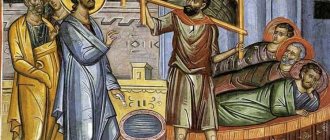In the Orthodox world, February 18 is the day of remembrance of Saint Agathia (Agatha) of Sicily. The people called the celebration Agafya the Cowgirl, since on this day it was customary to protect the most important nurses in the village - the cows.
Church holiday: what believers celebrate on February 18
Believers celebrate 3 church celebrations, which fall on February 18th. So, on this day the memory of Saint Theodosius, who was the Archbishop of Chernigov, is honored. He lived in the 17th century. Theodosius was canonized as a saint back in 1896.
Believers also remember the difficult fate of the martyr Agathia of Panorma (Palermo). She suffered severe torment for her faith in Jesus Christ during the reign of Emperor Decius. This happened in the 3rd century. People considered the saint the patroness of livestock, so they often turned to her with prayers for the protection of animals.
On February 18, the 5th day of the celebration of the continuous week continues, which is dedicated to the biblical parable of the publican and the Pharisees.
Also on this day it is customary to celebrate the feast of the icon of the Mother of God “Recovery of the Lost.” Believers pray in front of the icon with requests to help those who are on the threshold between worlds, for the missing, for those who live in poverty. It is also customary to ask for the marriage of your daughters.
Agafya, Vasilisa, Mikhail, Alexander celebrate their name days on February 18.
Fourth Commandment
In this commandment, God calls people to work 6 days a week, but the 7th day should be devoted to serving the faith and performing holy deeds. The following are considered deeds pleasing to God:
- take care of the salvation of the soul;
- enlighten the mind and heart with religious knowledge;
- engage in godly conversations;
- help the poor;
- comfort the mourners.
The Sabbath rest was given by God to man to restore spiritual strength and perform good deeds. By eliminating daily hassles, a person is spiritually renewed and comprehends the purpose of life. Work is important in the integrity of aspirations, but the salvation of the soul is considered more important.
Agafya Korovnitsa. Martyr Agathia of Panorma (Palermo)
Agathia was born into a Christian family in the city of Panorm (Palermo). When the persecution of Christians began under Emperor Decius (249-251), the girl decided to accept the crown of martyrdom. Her beauty charmed the local ruler Quintian. He tried to convince the girl of her faith, to seduce her with luxury and caresses. His attempts were unsuccessful. He became furious and subjected Agathia to cruel torture. She did not lose heart and patiently endured all the suffering. She died in prison on February 5, 251. Christians built a church at her resting place.
Saint Agathia is considered the protector from fire. In 252, Mount Etna began to erupt in Sicily, where she was from. Residents prayed to the saint and covered themselves with clothes from her tomb, like a shield from fire. The lava eruption stopped and did not harm people. They learned about the miracle that had happened on the island of Malta. Since then, Agathia has been revered as his patroness.
Prohibitions during Orthodox holidays
Celebrating holidays means abandoning all kinds of superstitions. If you have urgent work, then, of course, you must do it. The service sector, transport enterprises, security and defense factories will not stop due to a church holiday, people will work in accordance with their work schedule. However, there are certain and very simple rules for the behavior of an Orthodox person during Christian holidays:
- In the morning you need to visit the temple and, after attending the service, pray and receive communion.
- And spend the entire next day in the family circle among relatives and friends.
- At the same time, be sensitive and caring, observing Orthodox canons.
The church does not have any special prohibitions for various human activities, but maintaining peace of mind and doing good deeds is strongly encouraged. Work cannot serve as a desecration of the soul if, while doing it, a person remembers the commandments of God and the Heavenly Father himself. To increase faith, you should not listen to those who spread superstitions and various speculations. Often ancient signs have roots in paganism, and this directly contradicts the commandments of Christ.
What holidays are celebrated in Russia and other countries of the world on February 18
In Russia, on February 18, transport police officers receive congratulations. In addition, the country celebrates Armed Forces Clothing and Food Service Day.
The calendar of holiday events also includes:
- Battery Day;
- Pluto Day;
- Dumpling Day;
- A holiday for all frivolous people.
Women's Heart Day, as well as Wine Drinking Day, is celebrated in America on February 18th. Gambians celebrate Independence Day, while Japan celebrates Island Languages Day.
Signs against tidying
In ancient times, several basic rules were observed in Rus':
- You cannot clean at night or after sunset, otherwise you can wash away the joy and family well-being.
- While one of the loved ones was on the road, the floors were not washed or scrubbed. They believed that this meant expulsion of the traveler from home and trouble during separation.
- Cleaning was done only with the windows closed to avoid quarrels in the family.
- It was forbidden to cook food and clean the hut at the same time, which is the sin of modern housewives. Primete says if you do this, there will be no food in the family.
The priests do not hold the same opinion; to follow such signs and superstitions means to deviate from the Holy Scriptures. There are no such prohibitions in the Bible; the only thing it says is the prohibition of cleaning on Sundays. On this day, all the concerns of a Christian should be related to caring for the soul.
What not to do on February 18
According to popular wisdom, you should not work hard or overeat on this holiday. The consumption of alcoholic beverages is also prohibited. You cannot lend or borrow money, as financial difficulties may arise. It is better to reschedule your visit to another day.
Our ancestors bypassed the forest on February 18, since the wedding season of animals began during this period. You cannot refuse help on this day, especially to loved ones. Quarrels, swearing and foul language are also prohibited.
Why can't you do the cleaning?
There have always been many superstitions surrounding this topic. Our ancestors honored the old signs and always obediently followed them. As we said, the church does not make any special prohibitions. The main thing is to remember God. Some superstitions came to us from antiquity.
This is how our ancestors spent their holidays: in the morning they washed themselves, got dressed and went to the local church for prayer. On the way back we stopped by to see relatives and parents. They started doing minor work in the evening. There was no general cleaning done on the eve of the holiday. It was a sin. It was believed that a person could attract bad things to himself by sweeping good things out of the house. Garbage not collected the day before became holy. You cannot remove it on a holy day. This meant throwing out the most beloved and dear things from the house.
The Orthodox believed that a person who cleans up on a holiday is doomed to various diseases. Fearing God and illness, Christians strictly followed the sign.
Modern clergy believe that it is not worth completely following the example of their ancestors.
Signs against cleaning
In Rus' there were many signs against cleaning.
- The Orthodox did not clean at night or after sunset. This can wash away the well-being of a family.
- While loved ones are on the road, you can’t clean the house. It was believed that in this way we drive guests away, we want them not to come again.
- You need to clean the house with the windows closed. Otherwise there will be a quarrel in the family.
- It is very convenient to clean and prepare food at the same time. But, unfortunately, this cannot be done. According to a sign, food will disappear in the family. Although, according to priests, there is nothing wrong with combining household chores.
There is no point in following these signs. These are all superstitions. The Bible does not focus on such things. The only thing the Bible forbids is cleaning on Sundays.
What exactly should you not do on church holidays?
- Do not swear. Even on weekdays, by swearing, people defile their souls. The right to speak is given to us for communication with God and loved ones, but definitely not for abuse. Foul language is considered a mortal sin. Christianity prohibits swearing not only on Holy Days, but on any other days.
- Can't be washed. Washing by hand has always been hard work. Especially if you have to carry water from their river or well. If there is a newborn in the family, then they washed it after the service. Priests advise spending this time in prayer
- It is forbidden to wash. It was believed that one could go to the next world. After all, in order to wash, you need to chop wood and flood the bathhouse. All this is hard physical labor. The Church does not recommend washing. And he considers replacing a holiday with a “beach vacation” a huge disrespect for God.
- Handicrafts are not allowed. There were no clothing stores at that time. Women sewed their own clothes. Handicrafts were not considered a pleasant activity. It was considered work. And needles and knitting needles were considered by the church as nails that were pierced into the Body of Christ. Should I do handicrafts? According to the priest, it is possible if you are asked to do so. You need to do good deeds on any day.
- Orthodox people do not work in the garden. This is a forbidden activity on holidays, as it takes a lot of energy. It was possible to cancel the potato planting. But I had to milk the cow and feed the cattle. Working in the garden during the holiday is perceived by priests as disrespect for themselves and God.
How to spend a Sunday?
Sunday is the best day to spend with your family. Most often, it happens that you are busy with business all week, of course, but you try to free Sunday for cleaning and other household chores. It's better to go for a walk with your children, chat with your husband, or visit your parents instead. This will bring much more benefit to everyone than running around the house with a rag in your hands.
Some women believe that the holidays have arrived, so cleaning should be organized first. This shouldn't happen.
On a day of pleasant time with your family, you can think about spiritual self-development and attending church services in the morning. Believers prefer to spend their day off in prayers and other important matters. This practice clears the mind and prepares for the coming week. As for other activities, choosing useful ones is not so difficult.
What is recommended to do
If previously only household tasks fell on Sunday, now you need to diversify your leisure time. You can read useful tips on repairs and do them on weekdays, study culinary recipes and please your loved ones on the next Orthodox holiday. And if a woman decides that I want and can clean, and the house will be clean, then she has the right to do so.
The main thing is not to bother yourself by doing other things. They are best done gradually.
What do the clergy advise?
The clergy keep up with the times and do not get hung up on the prohibitions that were common many years ago. The Church claims that no one forbids washing or doing handicrafts. You should only refrain from hard work. Also during church holidays, visiting the temple is recommended. Sunday is best dedicated to God and family.
Where did this ban come from?
Where and why did the ban come from, why can’t you clean and do laundry on Sundays and holidays? A large number of recommendations regarding prohibitions of any activity are based on centuries-old Orthodox traditions.
The customs have been followed for many centuries, which is why people still adhere to them. In ancient times, it was believed that only lost souls were capable of committing sin.
Signs
There are not as many church prohibitions as there are signs that religion does not approve of. For example, it is believed that you should not clean on Sunday because you might sweep money out of the house. As a result, the family will go hungry. On some Orthodox holidays, it is forbidden to swim, braid your hair, or use sharp objects.
All these signs, sins and similar prohibitions have nothing to do with religion and should not be taken seriously. You can clean and do household chores if it does not cause much difficulty.
Beliefs against work
Any Orthodox holiday is a special, important day for a believer, which should be dedicated to church, prayers, a festive table, as well as communication with loved ones. Everything else is superfluous. Few people would, for example, wash the floor instead of making wishes during the chimes on New Year's Eve. So why should a Christian holiday be any less important as a reason to take a break from everyday life?
During the time of serfdom, a church holiday was one of the few days when it was possible not to work for the master. Rest was a rare occurrence, the right to it was valued, and any attempts in its direction were considered a sinful activity.
In addition, Orthodox traditions were built on the basis of pagan ones that existed on Russian lands before the baptism of Rus'. The pagans also did not do household chores on days dedicated to the Gods. One version of the ban says that it was possible to gather former pagans in the temple, separating them from everyday affairs, only under the threat of God's punishment. Judging by the surviving decree of the 17th century, a similar problem existed in the 17th century. The document ordered the closure of baths and markets on church holidays so that believers would definitely get to the temple.
Cleaning recommendations
In order for cleaning to proceed in the best possible way, it is worth remembering a few simple rules:
- The rubbish is not swept out of the door.
- They sweep and wash the apartment from the far corner to the entrance.
- According to Feng Shui, when cleaning, you need to activate all 5 elements: use a plant broom, sweep away dust and sand, wash floors and things with water, ventilate the room and burn everything unnecessary. To comply with safety precautions in modern apartments, fire can be used by fumigating the room with an aromatic mixture.
- After cleaning, you should thoroughly wash your hands or take a shower.
This is interesting: in the old days, the saying “not to wash dirty linen in public” was taken literally and household waste was burned in ovens.
Many people like to clean up, feeling internal cleansing and putting their thoughts in order. They say that the desire to clean awakens with mental experience, but you need to get used to cleanliness from a young age. Simple signs help to maintain your territory in harmony physically and sacredly.










